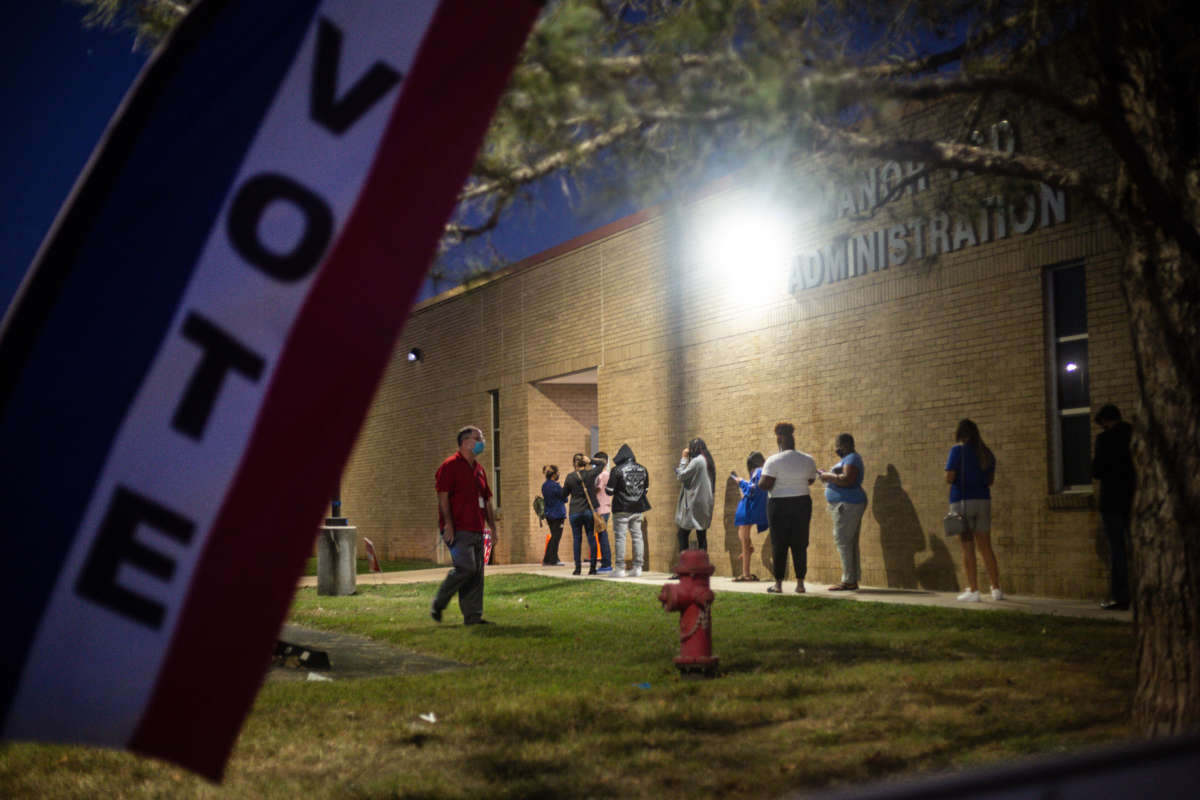Part of the Series
Voting Wrongs
A voter suppression bill currently being considered by the Texas legislature would decrease the number of polling locations in districts that are traditionally Democratic and nonwhite while increasing the locations in Republican and predominantly white districts.
The state experienced high turnout for the 2020 election, especially in more heavily populated areas like Houston. Now, Republicans are targeting those very places in an elections bill, SB 7, applying a formula to redistribute polling locations in the state’s five most populous counties that the Texas Tribune has found would disproportionately affect voters in Democratic communities.
In Harris county, which houses Houston, all but two of the area’s 15 Democratic districts would see a decrease in polling locations thanks to the new formula. District 141, which is also home to the largest portion of nonwhite people of voting age of any other district in the county — white people make up only 10.6 percent of the population of voting age there — would be hit the hardest, losing 11 polling places.
All of the districts in Harris county that would be losing polling places are represented by Democrats. Meanwhile, every district represented by a Republican would either not see a change or would gain polling locations. All of those districts have white voting age populations of 45 percent or more, according to census data.
The Texas Tribune analysis also finds similar trends in other counties. In Tarrant County’s district 90, which is represented by a Democrat and where 77 percent of the population is either Latino or Black, voters would lose half of the polling locations they had in 2020.
SB 7 would also implement a number of other voting restrictions, such as limiting the distribution of absentee ballots, allowing for more voter roll purges, and limiting early voting with provisions like banning drive-through voting. The bill, if signed into law, would make Texas one of the hardest states in the country for citizens to exercise their right to vote.
State lawmakers are currently ironing out the final details of the bill, after which it will have to clear a vote again in the Senate and the House. The GOP controls both chambers of the legislature and the governor, Greg Abbott, is a Republican.
Though the election bill will affect millions of voters in the state, Republicans have shrouded the process of writing and amending the bill in secrecy. The committee currently making amendments to the bill is doing so behind closed doors, much to the dismay of many voting rights advocates.
Republican Rep. Briscoe Cain also previously tried to rush the voting restriction bill out of committee without listing it on the committee’s agenda, giving journalists no notice of the bill’s movement and the public no chance to comment on it.
Cain has said that the bill isn’t about voter suppression in his opinion. “I believe it is voter enhancement,” he said this month of the bill that would make it harder for people of color to vote. The bill, which Cain has sponsored, also has language plucked straight out of Jim Crow, including phrases that suggest it is necessary to “preserve the purity of the ballot box.”
Republicans have been quite open with their goals in this year’s wave of voter suppression laws: they are trying to engineer situations so that Republicans can’t lose elections again. In March, an Arizona lawmaker said that the GOP is passing such laws because “everybody shouldn’t be voting.”
The GOP has been passing voter suppression laws at record pace, introducing hundreds over the course of just a few months. Democrats — both at the state and federal level — have been trying to stem the tide, but Republicans are forging ahead, especially in states where they control the governorship and the legislature.
Before the Texas House passed a version of SB 7 earlier this month, Democrats fought the legislation through the night, introducing 130 amendments to the bill. And, at the federal level, Democrats are trying to pass the For the People Act, which would drastically expand voting access — but the Senate filibuster stands in its way.
Media that fights fascism
Truthout is funded almost entirely by readers — that’s why we can speak truth to power and cut against the mainstream narrative. But independent journalists at Truthout face mounting political repression under Trump.
We rely on your support to survive McCarthyist censorship. Please make a tax-deductible one-time or monthly donation.
